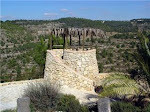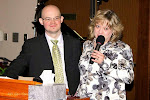Next, I sang my Psalms and read my daily portion, then began to pray the Lord's prayer. When I came to the line, "Thy Kingdom Come," my mind went to the parable of the hidden treasure: The kingdom of heaven is like treasure hidden in a field. When a man found it, he hid it again, and then in his joy went and sold all he had and bought that field. Matt 13:44. the line: and bought the field was suddenly illuminated to me.
The Holy Spirit directed my thoughts to story of Ruth and how Boaz, through the ancient Law of Moses concerning the Right of Redemption, became the redeemer of the field.
Now Boaz went up to the gate and sat down there; and behold, the close relative of whom Boaz had spoken came by. So Boaz said, “Come aside, friend, sit down here.” So he came aside and sat down. 2 And he took ten men of the elders of the city, and said, “Sit down here.” So they sat down. 3 Then he said to the close relative, “Naomi, who has come back from the country of Moab, sold the piece of land which belonged to our brother Elimelech. 4 And I thought to inform you, saying, ‘Buy it back in the presence of the inhabitants and the elders of my people. If you will redeem it, redeem it; but if you will not redeem it, then tell me, that I may know; for there is no one but you to redeem it, and I am next after you.’”
And he said, “I will redeem it.”
5 Then Boaz said, “On the day you buy the field from the hand of Naomi, you must also buy it from Ruth the Moabitess, the wife of the dead, to perpetuate the name of the dead through his inheritance.”
6 And the close relative said, “I cannot redeem it for myself, lest I ruin my own inheritance. You redeem my right of redemption for yourself, for I cannot redeem it.”
7 Now this was the custom in former times in Israel concerning redeeming and exchanging, to confirm anything: one man took off his sandal and gave it to the other, and this was a confirmation in Israel.
8 Therefore the close relative said to Boaz, “Buy it for yourself.” So he took off his sandal. 9 And Boaz said to the elders and all the people, “You are witnesses this day that I have bought all that was Elimelech’s, and all that was Chilion’s and Mahlon’s, from the hand of Naomi. 10 Moreover, Ruth the Moabitess, the widow of Mahlon, I have acquired as my wife, to perpetuate the name of the dead through his inheritance, that the name of the dead may not be cut off from among his brethren and from his position at the gate. You are witnesses this day.”
11 And all the people who were at the gate, and the elders, said, “We are witnesses. The Lord make the woman who is coming to your house like Rachel and Leah, the two who built the house of Israel; and may you prosper in Ephrathah and be famous in Bethlehem. 12 May your house be like the house of Perez, whom Tamar bore to Judah, because of the offspring which the Lord will give you from this young woman.”
Next, my attention was drawn to another story concerning the right of redemption. This is found in Jeremiah 32:
6 And Jeremiah said, “The word of the Lord came to me, saying, 7 ‘Behold, Hanamel the son of Shallum your uncle will come to you, saying, “Buy my field which is in Anathoth, for the right of redemption is yours to buy it.”’ 8 Then Hanamel my uncle’s son came to me in the court of the prison according to the word of the Lord, and said to me, ‘Please buy my field that is in Anathoth, which is in the country of Benjamin; for the right of inheritance is yours, and the redemption yours; buy it for yourself.’ Then I knew that this was the word of the Lord. 9 So I bought the field from Hanamel, the son of my uncle who was in Anathoth, and weighed out to him the money—seventeen shekels of silver. 10 And I signed the deed and sealed it, took witnesses, and weighed the money on the scales. 11 So I took the purchase deed, both that which was sealed according to the law and custom, and that which was open; 12 and I gave the purchase deed to Baruch the son of Neriah, son of Mahseiah, in the presence of Hanamel my uncle’s son, and in the presence of the witnesses who signed the purchase deed, before all the Jews who sat in the court of the prison.
13 “Then I charged Baruch before them, saying, 14 ‘Thus says the Lord of hosts, the God of Israel: “Take these deeds, both this purchase deed which is sealed and this deed which is open, and put them in an earthen vessel, that they may last many days.” 15 For thus says the Lord of hosts, the God of Israel: “Houses and fields and vineyards shall be possessed again in this land.”’
Yeshua the Messiah was our Kinsman redeemer and He left His glory to come down and tabernacle among us, to redeem us from evil. He bought the field, thereby marrying Himself to us! What a glorious revelation!!!

